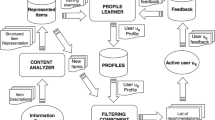Abstract
APEX is an adaptive disk scheduling framework with Quality-of-Service (QoS) support designed for environments with highly varying disk bandwidth usage. APEX is based on a three-layer scheduling architecture: (1) the upper layer realizes different service classes using a set of queues; (2) the mid-layer distributes available disk bandwidth among these queues; and (3) the lower layer is handled by the disk itself, which does the final ordering of disk requests. We demonstrate the use of APEX in an example scenario, a Learning-on-Demand (LoD) application supported by a multimedia system, where students can search for and playback multimedia-based learning material. In this paper, we present the scheduling concepts of APEX which are based on an extended token bucket algorithm. The disk requests scheduled for service are assembled into batches in order to exploit the intelligence of modern disks. Combined with a specialized work-conservation scheme, this enables APEX to apply bandwidth where it is needed, without the loss of efficiency. We demonstrate, through simulations, that APEX provides both higher throughput and lower response times than other mixed-media disk schedulers while still avoiding deadline violations for real-time requests. We also show its robustness with respect to misaligned bandwidth allocation.
Similar content being viewed by others
References
Halvorsen, P., Griwodz, C., Goebel, V., Lund, K., Plagemann, T., Walpole, J.: Storage system support for continuous media applications. Part 1. Requirements and single-disk issues. IEEE Distribut. Syst. Online 5(1) (2004)
Denning, P.J.: Effects of scheduling on file memory operations. In: AFIPS Spring Joint Computer Conference, pp. 9–21 (1967)
Liu, C.L., Layland, J.W.: Scheduling algorithms for multiprogramming in hard-real-time environment. J. ACM 20(1), 47–61 (1973)
Reddy, A.L.N., Wyllie, J., Wijayaratne, K.B.R.: Disk scheduling in a multimedia I/O system. In: ACM Trans. Multimedia Comput. Commun. Appl. 1(1), 37–59 (2005)
Yu, P.S., Chen, M.S., Kandlur, D.D.: Design and analysis of a grouped sweeping scheme for multimedia storage management. In: Third International Workshop on Network and Operating System Support for Digital Audio and Video (NOSSDAV'92) pp. 44–55. La Jolla, CA, USA (1992)
Anderson, R., Osawa, Y., Govindan, R.: A file system for continuous media. Trans. Comput. Syst. 10(4), 311–337 (1992)
Martin, C., Narayanan, P.S., Özden, B., Rastogi, R., Silberschatz, A.: The Fellini multimedia storage system. J. Digital Lib. (1997)
Shenoy, P., Vin, H.M.: Cello: A disk scheduling framework for next generation operating systems. Special issue on flexible scheduling of real-time systems. Real Time Syst. J. 22(1), 9–47 (2002)
Kamel, I., Niranjan, T., Ghandeharizedah, S.: A Novel Deadline Driven Disk Scheduling Algorithm for Multi-Priority Multimedia Objects, ICDE 2000 pp. 349–358. San Diego, CA, USA (2000)
ISO: Overview of the MPEG-4 Standard, ISO/IEC JTC1/SC29/WG11 N3536, Beijing (2000)
W3C: Synchronized Multimedia Integration Language (SMIL 2.0), Recommendation, W3C (2001)
Seagate: Barracuda ATA IV Family Product Manual (2001)
White, B., Ng, W.T., Hillyer, B.K.: Performance comparison of IDE and SCSI disks. Technical Report, Bell Labs (2001)
Lumb, C.R., Schindler, J., Ganger, G.R.: Freeblock Scheduling Outside Of Disk Firmware. In: The First USENIX Conference on File and Storage Technologies (FAST'02) pp. 275–288. Monterey, CA, USA (2002)
Worthington, B.L., Ganger, G.R., Patt, Y.N., Wilkes, J.: On-line extraction of SCSI disk drive parameters. In: ACM SIGMETRICS pp. 146–156. Ottawa, Canada (1995)
Schindler, J., Ganger, G.: Automated disk drive characterization. CMU SCS Technical Report CMU-CS-99-176, Carnegie Mellon University (1999)
Lund, K.: Adaptive disk scheduling in a multimedia DBMS. Doctoral thesis, Department of informatics, University of Oslo (2003)
Lund, K., Goebel, N.: Adaptive disk scheduling in a multimedia DBMS. In: ACM Multimedia (ACM MM'03) pp. 65–74. Berkeley, CA, USA (2003)
Stoica, I., Abdel-Wahab, H., Jeffay, K.: On the duality between resource reservation and proportional share resource allocation. In: Multimedia Computing and Networking pp. 207–214. San Jose, CA, USA (1997)
Ohnishi, H., Okada, T., Noguchi, K.: Flow control schemes and delay/loss tradeoff in ATM networks. IEEE J. Select. Areas Commun. 6(9), 1609–1616 (1988)
Revel, D., McNamee, D., Steere, D., Walpole, J.: Adaptive prefetching for device independent file I/O. In: Multimedia Computing and Networking (MMCN98) pp. 139–149. San Jose, USA (1998)
Ganger, G.R., Worthington, B.L., Patt, Y.N.: The DiskSim simulation environment version 2.0. In: Reference Manual. Carnegie Mellon University (1999)
Worthington, B.L., Ganger, G.R., Patt, Y.N.: Scheduling algorithms for modern disk drives. In: ACM Sigmetrics Conference pp. 241–251. Nashville, TN, USA (1994)
Boral, H., DeWitt, D.J.: A Methodology for Database System Performance Evaluation, ACM SIGMOD pp. 176–185. Boston, MA, USA (1984)
Shenoy, P.: DiskSim, http://lass.cs.umass.edu/software/disksim/ (1999)
Sundaram, V., Shenoy, P.: A practical learning-based approach for dynamic storage bandwidth allocation. In: International Workshop on Quality of Service (IWQoS'03) pp. 479–497. Berkeley, CA, USA (2003)
Author information
Authors and Affiliations
Corresponding author
Additional information
The work was conducted while Ketil Lund was an employee at UniK – University Graduate Center, Kjeller, Norway.
Rights and permissions
About this article
Cite this article
Lund, K., Goebel, V. & Plagemann, T. APEX: adaptive disk scheduling framework with QoS support. Multimedia Systems 11, 45–59 (2005). https://doi.org/10.1007/s00530-005-0189-0
Published:
Issue Date:
DOI: https://doi.org/10.1007/s00530-005-0189-0




